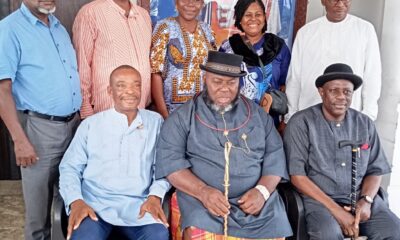Maritime
ISAN Tasks FG On Cabotage
The Indigenous Shipowners Association of Nigeria (ISAN), has
asked the Federal Government to put in place incentives to enable indigenous
operators perform better in domestic shipping, otherwise known as cabotage.
General Secretary of ISAN, Capt. Olaniyi Labinjo, made the
plea during an interview with our correspondent on Monday in Lagos.
“There are no established rewarding incentives as well as
patronage policies and guidelines for Nigerian operators engaged in domestic
shipping.
“This is unlike what obtains in other maritime jurisdictions
such as the UK, US, Canada, India, Indonesia and Malaysia, where their
governments have robust promotional and support initiatives,” he said.
Labinjo recalled that the association had submitted a
memorandum to the National Assembly in this regard during the Presidential
Maritime Retreat held in Abuja in July.
The ISAN scribe said that there was need to develop several
incentives, including cargo support, tax relief, duty waivers for ships and
spares.
He also urged government to provide financial incentives and
reduce port and harbour dues for cabotage vessels.
Labinjo expressed concern on the absence of a conducive
environment for the indigenous shipping fleet, adding that government should
encourage local ship owners who, according to him, have invested so much in the
business.
He also suggested exemptions from customs duty, company tax,
exemption of seafarers from tax, as some forms of relief which could be granted
the ship owners.
“The Cabotage Act at present provides that Nigerians must
carry 50 per cent of Nigerian-generated cargo, but since inception in 2004, not
one tonne has been carried by a Nigerian and there is need for this to be
corrected.
“Government fails to realise that by buying one ship and
giving incentives, so many people would be employed.
“ For example, the maritime newspaper publishers, insurance
companies, legal professionals and all other persons providing ancillary
services will be employed, ” he said.
Labinjo added that part of the recommendations of ISAN is a
call for the establishment of a board that would be responsible for licensing
of cabotage vessels and granting waivers to applicants, after giving indigenous
ship owners the first option of refusal.
He suggested that the composition of the board should
include a representative of ISAN, with the board being responsible to the
Minister of Transport.
“This is in line with practices in other jurisdictions,
namely USA, UK, Malaysia, Indonesia, India and Canada.
“Therefore, Sections 10 to 22 of the Cabotage Act should be
amended.” he added.
The ISAN scribe also urged that government should review the
penalties for contravening the Cabotage Act, saying that compared with other
jurisdictions, the penalties were light.
“We propose a very stiff penalty under Part VII, Sections
35-41 to include, but not limited to forfeiture of the offending vessel, a fine
of a minimum of N200 million and imprisonment for a minimum term of five years,
to deter would-be offenders.
He said that another area the association suggested for
review in the Act was the requirement for vessels to be built in Nigeria.
Labinjo, however, noted that this might be difficult as the
country lacked regular power supply and the raw material, steel
Maritime
Waterways Safety: NIWA Wants Partnership With Govs

The Managing Director of National Inland Waterways Authority (NIWA), Mr. Bola Oyebamiji, has called for increased collaboration between the federal agency and state governments to enhance the safety and security of inland waterways transportation.
Speaking at a one-day consultative forum on safety and insecurities on inland waterways, organized by the Nigeria Transportation Commissioners’ Forum in Ilorin, Oyebamiji emphasized the critical role that safety and security play in fostering a thriving water transportation system.
The forum, themed “Prevalent Safety, Security Hazards and Practices in Inland Waterways: Passenger Transport Safety in Ilorin, Kwara State”, sought to address the pressing issues facing the inland waterways sector.
Oyebamiji acknowledged the ongoing efforts by NIWA to improve safety, such as the recent unveiling of the transportation code for public use, the inauguration of several operational assets including survey boats, gunboats, water ambulances, and a passenger ferry.
He also noted that safety campaigns have been launched across all operational bases, targeting local communities in their native languages.
The NIWA boss stated the support from the National Assembly, including the ongoing discussions on establishing coastal guards and the attention safety and security on inland waterways have received from the House Committee on Inland Waterways.
In his closing remarks, Oyebamiji appealed to the Commissioners for Transportation across relevant states to collaborate with NIWA in areas such as training, safety campaigns, infrastructure development, and financial empowerment.
He stressed that while the challenges are significant, they are surmountable through collective action.
Maritime
Coastal Guard Bill’ll Unlock Marine Blue Economy Potential -FG

The Federal Government has conveyed its support for the establishment of the National Coast Guard.
The Government also commended the proponents of the bill for having the hindsight to initiate a course of action that, when passed, will be the catalyst needed in unlocking the nation’s maritime potential.
In a statement by the Head of Press, and Public Relations for the ministry, Muhammad Tahir Zakari, Minister of Marine and Blue Economy, Adegboyega Oyetola, was reported to have made this known at the National Assembly complex at the 1-Day Public Hearing on National Coast Guard Bill (NCG).
The statement stated that the bill when passed, will guarantee maritime safety, sustainable marine resource development and enhance economic growth.
Highlighting the major need for the National Coast Guard, the Minister identified: Maritime safety; Environmental protection through enforcing environmental regulations and conservation of marine ecosystems; and Enforcement of civil maritime laws to uphold laws governing civil maritime activities and enforce fishing regulations while preventing illegal exploitation.
It also include search and rescue to maritime emergencies and also conduct timely search and rescue operations.
He cited a 2009 publication by the African Centre for Strategic Studies, which noted that 15 of the 21 independent maritime nations in sub-Saharan Africa have dedicated coast guards and identify themselves as such.
Despite this, none of these nations have Nigeria’s population or the extent of its inland waterways and coastline.
While acknowledging the significant role of the Nigerian Navy in safeguarding the Nigerian maritime space following the collaborative effort with the Ministry of Marine and Blue Economy in the Deep Blue Project, which has shown great results with zero piracy in Nigeria’s territorial water in the last three years.
He, however, stressed the need for the National Coast Guard to complement the efforts of the Nigerian Navy in playing a critical role in preventing accidents, crime, and other threats to maritime activities
“A vast coastline of 850 km, the equivalent of 10,000 km in two ways. It is also a place of rich and diverse economic sources.
“While these opportunities are promising, they also present challenges such as pollution, overfishing, and unsustainable use of marine resources. The proposed National Coast Guard is equipped to tackle these issues”, he stated.
He urged the Senate and the National Assembly to lend their full support to the bill, noting that, “Nigeria Coast Guard will act as a vital complement to the Navy, of fostering a safe and sustainable maritime environment”.
He appealed for the establishment of a flexible, adaptive implementation strategy that would evolve into a midwife for the bill to succeed, while urging those with reservations to see the pressing need of the institution.
Earlier during the hearing, the President of the Nigerian Senate, Godswill Akpabio, commended members of the Committee on Marine and Transport for their unwavering dedication in piloting the initiative and advocating for the establishment of the National Coast Guard Bill.
Akpabio, represented by Sen. Akintunde Yunus, said the essence of the bill was to make critical decisions that will guarantee the safety of the nation’s waterways and protect the marine resources.
He stated that “the establishment of the National Coast Guard is not merely a legislative formality, but a dire necessity”.
Speaking also, the Chairman, Senate Committee on Marine and Transport, Sen. Sanni Eshinlokun, said the Bill was first read in the Senate on the 3rd of October while the Senate at its plenary deliberated on the General Principles of the Bill.
Senator Eshinlokun said, “The Bill was read for the second time and referred to the Senate Committee on Marine Transport for further legislative action.
Maritime
Private Sector Should Drive Blue Economy -Bello

Former Executive Secretary of the Nigerian Shippers’ Council (NSC), Barr. Hassan Bello, has charged the Federal Government not to designate any of its agencies as the lead agency to drive the blue economy if it actually wants Nigeria to make progress in the sector.
Bello, who made this call in his remarks at the 10th anniversary, lecture and awards of the Primetime Reporters in Lagos, midweek, advised the Federal Government to avoid the mistake made during the Cabotage era when it designated an agency as lead agency and the rest was now history.
He said for the sector to succeed, it required everyone’s contribution, urging the Minister to allow the private sector to drive the blue economy.
According to him, “Two things which we must be very careful about is to make.mistake, like we did with cabotage. If we remember carefully, Cabotage was coastal and Inland shipping, but that inland shipping was not emphasized.
“It was just for supply of oil and gas to the mother vessel, we couldn’t trade as we were doing from Asaba to Baro in Niger State, or carry cement or even petroleum products. So, we cannot restrict that to customs.
“Secondly, don’t give the Blue Economy to an agency to say it is the lead agency because everybody must have contributions to the Blue Economy. As we want to do, we have seen agencies struggling to have seminars on Blue Economy, it’s not even a government thing.
“Allow the private sector to take over this blue economy, don’t create fantastic departments and overload into the private sector. This is what is our problem.
“When we had the Cabotage, it was a NIMASA thing and when you talk about Cabotage, no! don’t go there, what is your own with Cabotage? So, Cabotage was colonized, the Blue Economy should not be colonized. We should have the ramification of that Blue Economy to make sure that everything trickles down”.
He however, noted that there had been a lot of progress by the various organs of government even before the designation of the Blue Economy Ministry saying, “Blue Economy has always been there just as we had the red economy, which is characterized by China’s quest for export for state directed economy.
“We even have the grey economy, which is that which is informal. We have the green economy and all shades of economy. So, it’s not new that we have the Blue Economy, what has been the call by stakeholders is for us to have a ministry that will cater for transportation and transportation is a cardinal or even the paramount part of the Blue Economy.
“I know we have sustainable use of ocean resources and many other things, but when you talk about the Blue Economy, the central point is the use of ocean and the inland waterways and other resources for diversification of our economy as the Convener has said”.
“We have to be conscious, concerted and even calculated to make sure that it works for us. It’s not just fancy thing that there’s a ministry for blue economy. There must be active participation of stakeholders and the involvement of the private sector to harness the resources and not anything fancy or pretentious. The government must involve the private sector.
By: Stories by Nkpemenyie Mcdominic, Lagos
-
Business8 hours ago
No Mandate To Revive National Carrier – Aviation Ministry
-

 News9 hours ago
News9 hours agoOgoni Day: MOSOP Unites, Demands Share from OML 11
-

 Politics2 hours ago
Politics2 hours agoAPP Wants INEC To Conduct By-Election To Fill Rivers Assembly Vacant Seats
-
Niger Delta8 hours ago
We’re Upgrading Tourism Sites Across C’River – Otu
-

 Niger Delta8 hours ago
Niger Delta8 hours agoKalabari Media Forum Hails Recognition Of Dokubo Asari As Amayanabo
-

 News8 hours ago
News8 hours agoIn 2025, God’ll Crush Rivers Enemies – Fubara …Prays For Peace, Progress Of State …As He Attends Crossover Service In Opobo
-
Rivers8 hours ago
Security: Experts Task Govt On Support For Paramilitary Organizations
-

 Business8 hours ago
Business8 hours agoNDLEA, NIMASA Strengthen Cooperation Against Drug Trafficking

